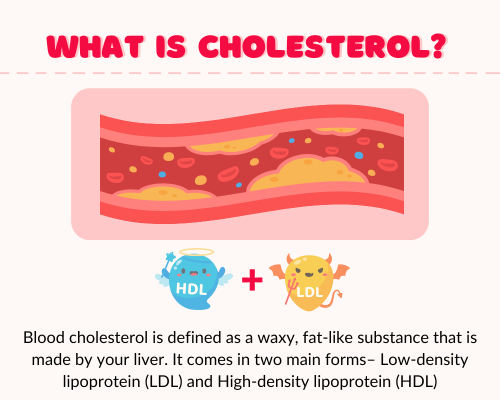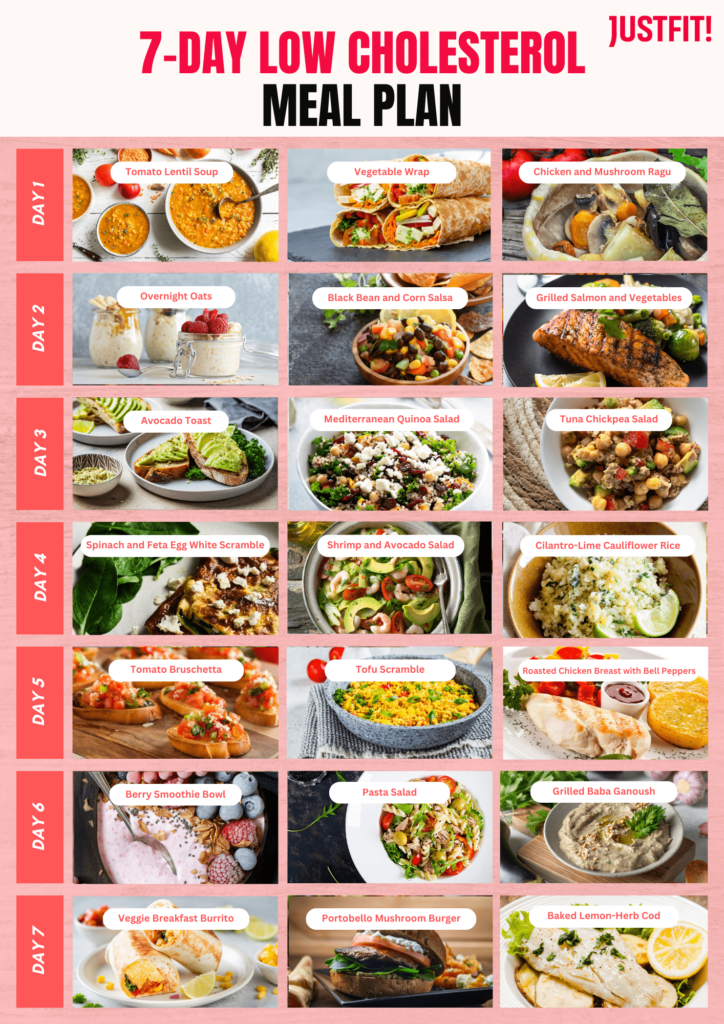




This simple 7-day low-cholesterol diet plan below provides a straightforward roadmap to kickstart your journey towards improved heart health.
Did you know that almost 2 in 5 adults in the United States have high cholesterol? This is especially worrying considering that elevated cholesterol levels could put you at risk of heart-related diseases [2]. As such, managing cholesterol levels plays a pivotal role in the quest for a healthier lifestyle.
Fortunately, taking a step towards better cardiovascular health is not that difficult as long as you stick to a heart-healthy diet. Besides a sample meal plan, we will walk you through information related to cholesterol and how to get started on this diet.
Key Takeaways
- Cholesterol comes in two main forms which are low-density lipoprotein (LDL) and high-density lipoprotein (HDL).
- Cholesterol is important in order for our body to function properly, produce hormones, and digest fatty foods.
- A low-cholesterol diet is beneficial in reducing the risk of chronic heart diseases, weight management, and improved blood circulation within the body.
- While on a low-cholesterol diet, you want to avoid foods that are high in saturated fat and trans fat.
- It is important to complement a low-cholesterol diet with other lifestyle modifications such as exercise and quitting unhealthy habits.
What Is Cholesterol And Its Impact

According to American Heart Association, blood cholesterol is defined as a waxy, fat-like substance that is made by your liver. It comes in two main forms– Low-density lipoprotein (LDL) and High-density lipoprotein (HDL) [4].
Low-density lipoprotein (LDL) is known as the “bad” or unhealthy cholesterol. When LDL cholesterol builds up in your arteries, it forms a waxy, fatty deposit known as plaques.
High-density lipoprotein (HDL) is known as the “good” or healthy cholesterol. HDL cholesterol helps to transport excess cholesterol from the arteries to the liver, which then expels it from the body.
The Impact of Cholesterol
The body relies on cholesterol to perform essential tasks such as making hormones and digesting fatty foods. It also aids in the proper functioning of the organs. While cholesterol is necessary for building cell membranes and producing hormones, excessive levels can lead to serious health complications.
A buildup of plaque in the arteries as a result of an excessive amount of LDL cholesterol increases the risk of heart disease and stroke. Therefore, there is a need to manage cholesterol levels and ensure that that does not happen.
Importance of Managing Cholesterol Levels
The problem with cholesterol is that its symptoms often go unnoticed because it is asymptomatic. The only way to determine whether you have potentially unhealthy cholesterol levels would be to get it checked.
The failure to manage cholesterol levels could put you at a significant risk of developing heart disease like heart attack and stroke. Heart attacks and stroke are the two leading causes of death in the United States and account for a quarter of deaths in England each year [2],[3].
Benefits of Low Cholesterol Diet
There are many benefits to low-cholesterol diets that range from improved heart health to weight management for overall health and enhanced well-being.
Reduces risks of chronic heart diseases
The most significant benefit of a low-cholesterol diet is that it helps to reduce the risks of chronic heart diseases. This is because you are reducing the level of LDL cholesterol and at the same time, increasing the level of HDL cholesterol. A lesser amount of LDL cholesterol would mean that the likelihood of plaque buildup in the arteries is lower.
Weight management
Another huge benefit of going on a low-cholesterol diet is that it helps with weight management. Many of the foods that are low in cholesterol are also low in calories and high in fiber. This promotes satiety and reduces the overall calorie intake, helping with weight management.
Improved blood circulation
By now, we know that a lowered LDL cholesterol would reduce the risk of atherosclerosis or plaque buildup in the arteries. When there is not really a plaque buildup, blood will be able to pass through the arteries much easier. This can lead to better oxygen delivery to organs and tissues, promoting optimal function.
How to Get Started
To get started on this diet, you want to first know what kinds of food you should and should not be eating. Once you have this information in hand, you can then create your own meal plans. Alternatively, you may choose to follow a specific diet meal plan such as the Mediterranean diet, DASH diet, and more.
Type of Foods to Eat
While on a low-cholesterol diet, you want to eat foods that are low in saturated fat, trans fat, and added sugar. These foods are the ones that will raise HDL cholesterol levels. Here’s a list of foods to eat:
- Fresh or frozen fruit without added sugar (apples, bananas, oranges)
- Vegetables (kale, spinach, broccoli, cauliflower)
- Whole grains (brown rice, oats, quinoa, whole grain bread)
- Lean meats (beef, chicken, turkey)
- Fish (salmon, halibut, cod)
- Legumes (beans, lentils, peas)
- Nuts and seeds (almonds, walnuts, pecans, chia seeds)
- Healthy fats and oils (olive oil, avocados)
Type of Foods to Avoid
Foods that you want to avoid would be ones that are likely to raise LDL cholesterol levels. Those foods often contain high saturated fat and trans fat. Here’s a list of foods that you should be avoiding:
- High-fat cuts of red meat (Beef, pork, lamb)
- Dairy products (Cream, ice cream, whole milk, cheese)
- Frozen Dinners (frozen pizza, frozen lasagna, frozen pies)
- Processed foods (cold cuts, sausage, bacon)
- Fast Food or fried foods (burgers, french fries, chicken nuggets)
- Commercially baked goods (Donuts, cookies, crackers)
- Fats and Oils (butter, margarine, lard)
7-Day Low Cholesterol Diet Plan

If you are interested in getting started on a low-cholesterol diet, here’s a sample meal plan to help you. This diet is suitable for beginners as well as for those who are already following a low-cholesterol diet. Like any other diet, feel free to change any foods or switch it up according to your dietary preferences.
Day 1
Breakfast: Tomato Lentil Soup
Lunch: Vegetable Wrap
Dinner: Chicken and Mushroom Ragu
Day 2
Breakfast: Overnight Oats
Lunch: Black Bean and Corn Salsa
Dinner: Grilled Salmon and Vegetables
Day 3
Breakfast: Avocado Toast
Lunch: Mediterranean Quinoa Salad
Dinner: Tuna Chickpea Salad
Day 4
Breakfast: Spinach and Feta Egg White Scramble
Lunch: Shrimp and Avocado Salad
Dinner: Cilantro-Lime Cauliflower Rice
Day 5
Breakfast: Tomato Bruschetta
Lunch: Tofu Scramble
Dinner: Roasted Chicken Breast with Bell Peppers
Day 6
Breakfast: Berry Smoothie Bowl
Lunch: Pasta Salad
Dinner: Grilled Baba Ganoush
Day 7
Breakfast: Veggie Breakfast Burrito
Lunch: Portobello Mushroom Burger
Dinner: Baked Lemon-Herb Cod
Other Ways to Manage Cholesterol
Although diet is the most important aspect, there are also other ways that you can try to manage cholesterol. Some of these ways include:
Exercise
Moderate physical activity can help to raise HDL cholesterol levels. Depending on your fitness level and the intensity of the exercise, you should strive to exercise for 30 minutes a day, 3 to 5 times a week. If you are unsure of what exercises to do, you can try out JustFit app which has workout plans and lazy workouts to choose from. The best part is that it includes a free 7-day trial!
Quit unhealthy lifestyle habits
It is important to quit unhealthy lifestyle habits such as smoking if you want to improve your cholesterol levels. Smoking in itself is bad so it is not surprising it is bad for your cholesterol as well. Once you stop, you will notice a number of benefits quickly. One of the most significant benefits is the improvement in HDL cholesterol levels.
Lose weight
Aside from diet, exercise, and quitting habits, losing weight is also a way to manage cholesterol. Carrying even the slightest excess weight can contribute to high cholesterol. So, you should incorporate a balanced diet and exercise to lose weight.
More Diet Plans
If you are looking for more diet plans, check out some existing articles on our JustFit Blog:
7-Day Weight Loss Low-Carb Diet
Summary
To sum up, we have to be more cautious about the kinds of food that we consume and lower the consumption of foods that are high in saturated fat and trans fat. Because cholesterol is a “silent killer”, we may be unconsciously eating our way to unhealthy cholesterol levels. It’s always better to be safe than sorry.
So, what are you waiting for? Start making a change to your diet. Remember, every little step counts!
What is the best diet to lower cholesterol?
What are the worst foods for high cholesterol?
How to reduce cholesterol in 30 days?
What are 5 foods that can lower cholesterol?
American Heart Association (2024) What is Cholesterol? [online]. Available at: https://www.heart.org/en/health-topics/cholesterol/about-cholesterol
Centers for Disease Control and Prevention (CDC) (n.d.) Cholesterol [online]. Available at: https://www.cdc.gov/cholesterol/
Mid and South Essex (2023) The importance of managing your cholesterol [online]. Available at: https://www.midandsouthessex.ics.nhs.uk/news/the-importance-of-managing-your-cholesterol/
Watson, S. (2023) The Effects of High Cholesterol on the Body [online]. Available at: https://www.healthline.com/health/cholesterol/effects-on-body





